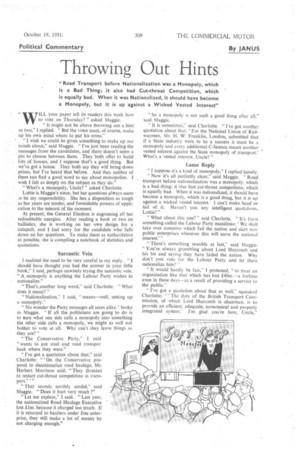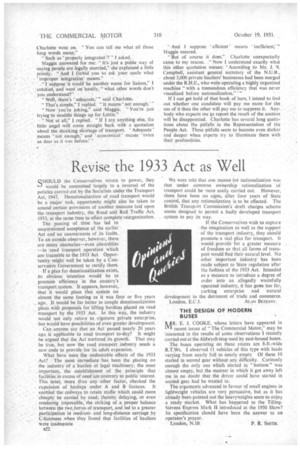Throwing Out Hints
Page 55

Page 56

If you've noticed an error in this article please click here to report it so we can fix it.
"Road Transport before Nationalization was a Monopoly, which is a Bad Thing; it also had Cut-throat Competition, which is equally bad. When it was Nationalized, it should have become a Monopoly, but it is up against a Wicked Vested Interest" . ILL your paper tell its readers this week how
to vote on Thursday?' ." asked Maggie.
"It might not be above throwing out a hint or two," I replied. "But the voter must, of course, make up his own mind where to put his cross." '
"I wish we could be given something to make up our minds about," said Maggie. "I've just been reading the messages from the candidates,. and there doesn't seem a pin to choose between them. They both offer to build lots of houses, and I suppose that's a good thing. But we got a house. They both say they will bring down prices, but I've heard that before. And they neither of them can find a good word to say about monopolies. I . . wish I felt as deeply on the subject as they do."
"What's a monopoly, Uncle?" asked Charlotte.
Lottie is Maggie's 'niece, but her questions always seem :o be my responsibility. She has a disposition as tough as her years are tender, and formidable powers of application to the interest of the moment.
At present, the General Election is engrossing all her redoubtable energies. After reading a book or two on ballistics, she is working on her own design for a catapult, and I feel sorry for the candidate who falls down on her questions. _To make them as authoritative as possible, she is compiling a notebook of statistics and quotations.
Sarcastic Vein I realized the need to be very careful in my reply. " I should have thought you had the answer in your little book," I said, perhaps unwisely trying the sarcastic vein. "A monopoly is anything the Labour Party wishes to nationalize."
" That's,another long word," said Charlotte. " What does it mean?"
"Nationalization," I said, "means—well, setting up a monopoly." "No wonder the Party messages all seem alike," broke in Maggie. "If all the politicians are going to do is to Wm what one side calls a monopoly into something the other side calls a monopoly, we might as well not bother to vote at all. Why can't they leave things as they are?"
"The Conservative Party," I said "wants to put steel and road transpor back where they were."
"I've got a quotation about that," said Charlotte: "'On the Conservative proposal to denationalize road haulage, Mr. Herbert Morrison said, "They threaten to restart cut-throat competition in transport."
"That sounds terribly sordid," said Maggie. "Does it hurt very much ?"
"Let me explain," I said. "Last year, the nationalized Road Haulage Executive lost Lim. because it charged too much. If it is returned to hauliers under free enterprise, they Will make a lot of money by not charging enough."
So a monopoly is not such a good thing after all," said Maggie.
"It is sometimes,said Charlotte. "I've got another quotation about that: 'For the National Union of Railwaymen, Mr. H. W. Franklin, London, submitted that if a State industry were to be a success it must be a monopoly and every additional C-licence meant another vested interest against the State monopoly of transport.' What's a vested interest, Uncle? "
Lame Reply
"I suppose it's a kind of monopoly," I replied lamely.
" Now it's all perfectly clear,"said Maggie. " Road, transport before nationalization was a monopoly, which is a bad thing; it also had cut-throat competition, which is equally bad. When it was nationalized, it should have become a monopoly, which is a good thing, but it is up against a wicked vested interest. I can't make head or tail of it. Haven't you any intelligent quotations, Lottie? "
"What about this one?" said Charlotte. "It's froat something called the Labour Party manifesto: 'We shall take over concerns which fail the nation and start new public enterprises wherever this will serve the national interest.'"
"There's something sensible at last," said Maggie. "You're always grumbling about Lord Hurcomb and his lot and saying they have failed the nation. Why don't you vote for the Labour Party and let them nationalize him?
"It would hardly be fair," I protested, "to treat an organization like that which has lost £40m.—a fortune even in these days—as a result of providing a service to the public."
"I've got a quotation about that as well," squeaked Charlotte: "'The duty of the British Transport Commission, of which Lord Hurcomb is chairman, is to provide an efficient, adequate, economical and properly integrated system.' I'm glad you're here, Uncle," Charlotte went on. 'You can tell me what all those long words mean."
"Such as properly integrated -7? " 1 asked.
• Maggie answered for rne: It's just a polite way of saying people are legally married," she explained a little • primly. "And I forbid you to ask your uncle what ' improper integration' means."
"I suppose it could be another name for liaison," I cracked, and went on hastily," what other words don't " you understand?"
" Well, there's ' adequate,' " said Charlotte. "That's. simple," 1 replied. " It means not enough.'" Now you're joking," said Maggie. You're just trying to muddle things up for Lottie."
• " Not at all," I replied, "if I say anything else, the little angel will come straight hack with a quotation about the shocking shortage of transport. 'Adequate' means 'not enough,' and 'economical'. means 'twice as dear as it was before.'"
And I suppose ' efficient' means ' inefficient; " Maggie sneered.
But of course it does." Charlotte unexpectedly came to my rescue. . " Now I understand exactly what this other quotation means: According to Mr. J. S. Campbell, assistant general secretary of the N.U.R., about 3,000 private hauliers' businesses had been merged under the R.H.E., who wete operating a highly organized machine "with a tremendous efficiency that was never visualized before nationalization." ' " If I can get hold of that book of hers, 1 intend to find out whether one candidate will pay me more for the use of it than the other will pay me to suppress it. Anybody who expects me to report the result of the auction will be disappointed. Charlotte has several long quotations about the pitfalls in the Representation of the People Act. These pitfalls seem to become even darker and deeper when experts try to illuminate them with their profundities.




































































































